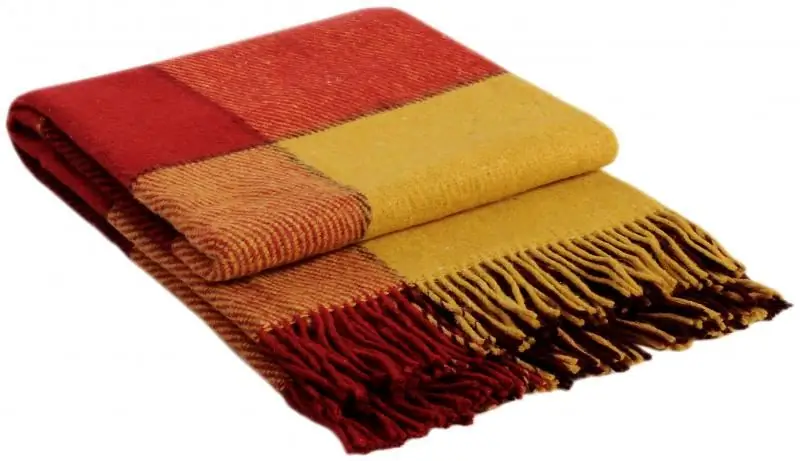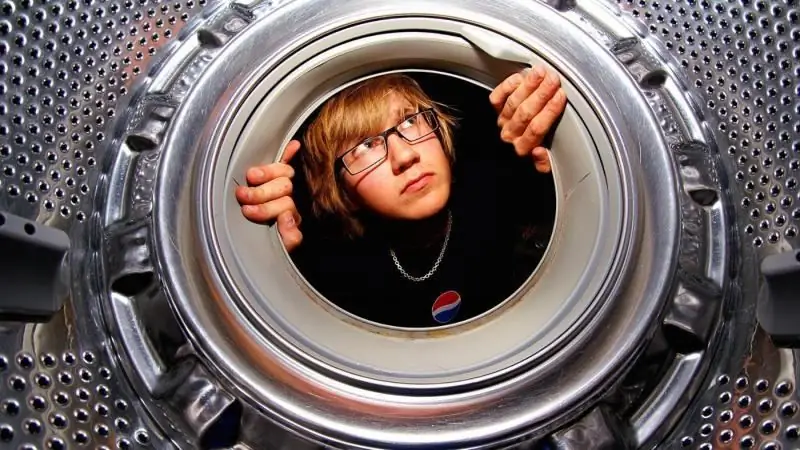
Table of contents:
- Author Bailey Albertson albertson@usefultipsdiy.com.
- Public 2023-12-17 12:53.
- Last modified 2025-06-01 07:32.
How to wash membrane clothing: all the details of care

When purchasing expensive outerwear, we hope that its service life will fully justify the money spent. However, there are a number of objective circumstances that make adjustments to these plans. For example, all sorts of pollution. And if the jacket or overalls are made of membrane fabric, then it seems that it is just right to throw the thing away - after all, many believe that it is impossible to wash membrane clothing. It's time to dispel myths.
Content
-
1 Understanding the terms
1.1 Purpose of membrane clothing
-
2 Considerations when cleaning
-
2.1 How to wash
2.1.1 Table. Means for washing membrane fabric
-
-
3 How to properly wash membrane clothing
- 3.1 By hands
- 3.2 In the washing machine
- 4 How to dry
- 5 And if you do not wash
-
6 Features of care
- 6.1 Video. How to care for membrane clothing: from personal experience of an angler
-
6.2 What you need to know about membrane reconditioning
6.2.1 Video. Why and how to use membrane impregnations
Dealing with terms
Membrane fabric is a combination of a base material (usually synthetic fiber, for example 100% polyester) and the membrane itself. The latter is the thinnest film, the thickness of which is tenths or hundredths of a millimeter.

The main function of the membrane fabric is to keep moisture out
The peculiarity of the membrane is that it has microscopic pores that allow moisture to pass through on one side and retain it almost to zero permeability on the other.
The film is pressed onto the base, that is, "welded". Due to its structure, the resulting fabric wicks sweat out, and therefore allows the skin to breathe. Due to the design features, the high performance membrane fabric is light in weight and very durable. According to this criterion, the following types of material are distinguished:
- two-layer (the membrane is fixed from the inside of the base);
- three-layer (outer fabric, membrane, mesh from the inside);
- 2.5-layer (membrane from the inside, but a protective coating is still sprayed on it).
The structure of the membrane can also differ, so tissues are
- pore-free (the structure of the material resembles a sponge - the micro-holes have a sinuous shape in which moisture condenses);
- porous (moisture molecules seep from the inside, but the drops do not fit);
- combined (the most expensive and high-tech ones, as the film with pores is laid inside, and without pores on the outside).

Membrane fabric is a high-tech material that can withstand any adverse weather conditions
Purpose of membrane clothing
The complex production technology of the material is explained by the purpose of the clothing. These things are recommended for activities that involve high physical activity:
- tourism;
- mountaineering;
- travel, etc.

Membrane things are comfortable for both adults and children
However, fabrics with a welded film have several disadvantages:
- clothes for membrane things should be made of fleece, polartec (for example, thermal underwear);
- membrane tissues are relatively short-lived;
- such a wardrobe needs special care;
- high price.
What to consider when cleaning
Until recently, it was believed that membrane fabrics cannot be washed. However, modern production technologies refute this statement. Moreover, such things are simply necessary to clean. But take into account some limitations.
- Ordinary washing powder clogs the pores of the membrane with its crystals, due to which it loses its main quality - air exchange.
- Chlorine-containing detergents damage the membrane, it ceases to reject water and becomes soaked.
- Rinses and conditioners reduce the water repellency of the fabric.
- The water temperature above 40 degrees will stick the pores together, and will also give the fabric a gray-brown tint, as the film will simply weld. For the same reason, things should not be ironed or dried on the radiator.
- Spinning causes irreparable damage to the fibers of the fabric, they stretch and break.
- Do not dry membrane fabric items in the sun or wind. Ultraviolet light will leave whitish stains on the fabric, making it impossible to recover the material.
What to wash
The right detergent will not only get rid of dirt, but will also not have a negative effect on the fabric.
Table. Means for washing membrane fabric
| Special cleaning gels | Application features | Conventional remedies | Application features |
| Nikwax Tech Wash | Cleans, imparts water-repellent function, allows fabrics to breathe. Recommended for Gore-Tex, Sympatex, Entrant, eVENT and Ultrex fabrics | Perwoll Sport & Active | Gives aroma, prevents unpleasant odors |
| DOMAL Sport Fein Fashion | Retains all the protective properties of the fabric | Concentrated product from Amway | It washes perfectly, especially for children's clothes with characteristic stains from food and drinks. |
| DM Fresh Sensation | Recommended for fabrics Goretex, Sympatex, budget product, but without water-repellent impregnation | Laundry soap, crushed on a grater | Good for hand washing, removes grass stains but leaves a very unpleasant odor. |
| Woly Sport Textile Wash | Universal membrane cleaner, suitable for all fabrics | Baby soap (either liquid or grated) | An alternative to laundry soap, copes a little worse with stains, but does not leave a smell. |
| Shower gels, shampoos | Mild detergents for hand washing (as heavy foam is harmful to the washing machine) and not to remove stains. | ||
| Liquid detergent "Laska" | Good for removing dirt, but not effective for removing grass stains, suitable for baby clothes | ||
| Antipyatnin soap | An effective remedy for greasy stains, it is recommended to wash the item completely after use. | ||
| Fairy Dishwashing Gel | Excellent for cleaning oil stains and can also be used as a mild laundry detergent. |

As a rule, manufacturers of membrane fabrics produce care products, including for washing clothes.
How to properly wash membrane clothing
In order not to damage the fragile membrane, a number of recommendations must be followed.
- Before starting cleaning, turn things inside out.
- We take out the contents of the pockets.
- We fasten all the zippers and buttons.
By hands
When choosing this type of cleaning membrane clothing, remember that you cannot rub even a stubborn stain strongly - the film may be damaged.
Instructions:
- We wet the thing.
-
Add detergent. Grated baby or laundry soap is perfect. True, one but: the latter can leave an unpleasant odor on the fabric, which is difficult to rinse out. So baby soap is preferable.

Laundry soap grated on a grater If you use laundry soap, it will be more convenient to grate it
- Rinse with warm water.
- We repeat the rinsing several times.
In the washing machine
Membrane things like space, that is, you should not load several wardrobe items into the drum at once. If the thing is oversized (for example, a jumpsuit), then it should be washed separately from the others.
Instructions:
- We choose a gentle mode (for example, "wool").
- We set the temperature to no higher than 40 degrees. Better than 30 degrees - and the dirt will go away, and the membrane will not weld.
-
Fill in the washing gel. We set 2-3 rinses and turn off the spin.

A bottle of detergent in a machine drum Detergent can be added either to the powder tray or directly to the drum of the machine
How to dry
It depends on the correct drying whether the clothes will be able to perform their function 100% in the future. So the final drying step is very important.
Instructions:
- Wrap the washed item in a terry towel. Alternatively, you can use a bathrobe.
-
After the terry has absorbed moisture, lay out the clean wardrobe item on a horizontal surface, while straightening the folds and creases.

Navy blue jacket with gray zip open Dry membrane clothing in a horizontal plane
- We dry clothes made of membrane fabric in a dry room with a very good supply of fresh air.
And if you do not wash
Fresh, greasy stains can be removed without washing. For this, the dirt is cleaned off with a brush or cloth. In this case, the dirt is shaken off, not rubbed. You can also slightly moisten the stain and wash it. These cleaning methods are especially relevant for baby clothes. But oil stains cannot be removed without washing. In this case, preliminary processing of the greasy trail is needed. To do this, you can use the following tools:
- Fairy dishwashing gel (put on a cotton pad, wipe the stain from the edges to the center, rinse and wash the thing);
-
Antipyatnin soap (rub the stain, leave it on for 15-20 minutes, wash clothes);

Antipyatnin soap bar It is more convenient to apply soap with a cotton pad slightly moistened with water
- bile-based stain removers.
Care features
The service life of any thing depends on how correctly it is stored. This rule also applies to clothing made of membrane fabric.
- The pores absorb odors very quickly and permanently, so store your clothes away from the kitchen.
- The cabinet should not be humid, otherwise the membrane will become saturated with dust, the pores will clog, and the thing will cease to perform its functions.
- Wardrobe items made of fabric with a film should be washed at least once a year.
- After washing, we use impregnations to enhance the water repellency and to stimulate resistance to dirt. These fluoride-based products are available as a liquid, which is diluted with water according to the instructions on the package (Nikwax TX. Direct Wash-in, Toko Eco Wash-In Proof) or spray (for example, Revivex, Nikwax TX Direct Spray-On). We add liquid products when rinsing, repeating the procedure after 1-2 washes, as more frequent use will clog the membrane. The impregnation in the form of a spray can be applied once every 3-4 weeks of active use of the item.
Video. How to care for membrane clothing: from personal experience of an angler
What you need to know about membrane repair
Impregnations are not only the final stage of cleaning, but also do a good job of restoring the membrane. They should be used in accordance with the recommendations of the fabric manufacturers. True, if the film began to blow through, then it can no longer be restored.
Video. Why and how to use membrane impregnations
Care of membrane things: washing, impregnation, proper storage is a rather troublesome business. But compliance with all the recommendations of manufacturers of high-tech material makes it possible to fully experience the benefits of using this type of fabric, which fully pay off the time and effort.
Recommended:
How And How To Wash Blood From Clothes And Linen At Home, Ways Of Washing By Hand Or In A Washing Machine + Photos And Videos

How to effectively remove fresh or old blood stains on clothes made from different fabrics? We apply folk advice in practice, using materials at home
How To Wash Sneakers In The Washing Machine And By Hand, Including White, The Nuances Of Washing + Photos And Videos

Sneakers are shoes that are comfortable and easy to wear for a walk, nature and even a date. If they get dirty, it doesn't matter. You can always wash them
How To Wash A Blanket At Home, Is It Possible To Use A Washing Machine, Which Mode To Choose + Photos And Videos

What materials are blankets made of? Natural and artificial fabrics. How to wash them in the washing machine or by hand. Proper storage
How To Clean The Washing Machine From Dirt Inside And Outside, Cleaning The Filter, Powder Tray, Drum, Drain Hose And Other Parts

The reasons for the appearance of dirt and odor in the washing machine, the main places of accumulation. How to clean it correctly: detailed descriptions and videos
How And At What Temperature To Wash Clothes For Newborns, Detergents For Washing Baby Clothes In A Washing Machine And By Hand

Basic rules for washing clothes for newborns. Requirements for the composition and effect of children's laundry detergents. How to machine wash baby clothes and by hand
